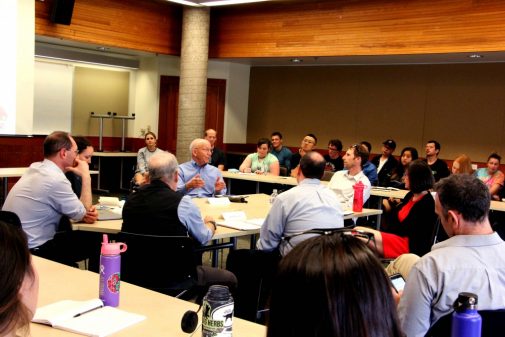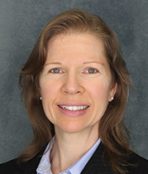-
July 11, 2019
Hurwitz and DeFazio talk transportation at UO

Last April, PacTrans Associate Director at OSU, David Hurwitz, took part in professor Marc Schlossberg’s Bicycle Transportation course at the University of Oregon, along with other UO students, faculty members, and transportation researchers.
Participants got the opportunity to sit in on and students dealt out questions on issues such as privacy concerns and climate change, and how our society can become better equipped to face them, at a high-level policy discussion with one of the most influential lawmakers in the world of transportation: U.S. Rep. Peter DeFazio.
DeFazio is the House Transportation and Infrastructure Committee chairman and a UO alumnus. Hurwitz and the Springfield Democrat were joined at this event by UO’s director of the Environmental and Natural Resources Law Center, Heather Brinton; computer science professor, Stephen Fickas; psychology professor, Elliot Berkman; and planning, public policy, and management professor, Rebecca Lewis.
Topics of discussion ranged from the surprising acceptance of electric scooters to the psychological and structural barriers that keep more travelers from walking or biking to their destinations.
“One thing that’s exciting to me is a year ago, people weren’t even talking about scooters as a form of transportation,” Hurwitz said, according to Around the O. “Here’s a mode of transportation that didn’t exist a year ago and now they represent tens of millions of trips in the U.S., revealing a massive preference for a new way to travel for trips under two miles. Our challenge is to help cities understand how to capitalize on the opportunities and challenges scooters present in terms of street design, policy, equity and safety.”
One major talking point explored how futuristic modes of transportation, particularly automated vehicles, might affect cities when it comes to their use of street space and low-carbon transportation methods. This prompted DeFazio to share a story about a recent visit to a self-driving car technology company.
During the visit, DeFazio witnessed a bunch of kids playing around a parked car, later realizing that this was how the car learned to predict the children’s behavior by using sensors to observe their actions. Though this is an impressive advancement in autonomous technology, DeFazio also brought up some of the questions raised within Congress regarding the liability issues surrounding this type of technology.
A lot of the research done at UO addresses a similar issue, it just approaches it differently. UO research looks at this problem through a lens of how cities can be redesigned to fit the needs of travelers on foot, bike, or scooter, rather than trying to rewire cars so they avoid people and objects in transit.
The open discussion was met with success. Students got to hear and contribute to a conversation with experts in many fields who wouldn’t normally get the chance to share their perspectives on these particular matters.
“I thought it was a tremendous experience for the students to be able to listen to candid talks and sometimes differing opinions from these scholars and Congressman DeFazio,” Schlossberg said, according to Around the O. “These are important issues that students are tackling as part of applied projects in this class, ones that will definitely be part of their professional work once they leave campus. This was a beneficial and fun way to involve them now.”


